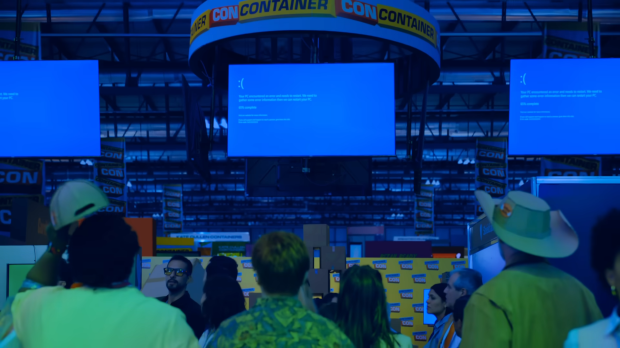It's not unusual for tech companies to poke fun at their direct competitors through slick marketing campaigns, or advertisements, and Apple is no stranger to this, nor is Microsoft. However, Apple is the latest company to throw punches at the Windows maker, and this time it's using the nefarious Blue Screen of Death (BSOD) as a way of propping up Mac over Windows.
Apple has used the CrowdStrike debacle that happened on July 19, 2024, when the security firm released a faulty update to its Falcon Sensor, its malware detection software, and as a result, millions of Windows PCs around the world crashed with BSODs. It's estimated that 8.5 million PCs were knocked offline as a result of the faulty update.
More specifically, the faulty update involved a configuration file that triggered an out-of-bounds memory access. When Windows runs its validation, it detected this out-of-bounds memory, flagging it as a critical failure, and to protect the system from any further harm, Windows automatically terminates any further processes and presents a BSOD to the user informing them of the misvalidation. Notably, CrowdStrike's Falcon software operates within the Kernel of a Windows PC, meaning it has privileged access to the system's components and drivers.

Why give the software such deep access to a machine? Cybersecurity software having essentially full access to a system can come with many benefits, as it's able to detect malware hiding deep within a system, possibly even before the Windows desktop is shown to a user. However, operating within the Kernel is risky, as any misvalidation will cause a BSOD, as with what happened with CrowdStrike.
Apple has poked fun at this pain point for Windows by showcasing a group running a business experiencing a BSOD event at a convention, and their business being completely fine to showcase its products since they are using Macs, while everyone else is using Windows. There is even a point in the advertisement where Apple explains why Macs are working and PCs aren't:
"What you are witnessing is a classic PC failure, as tragic as it is predictable. Lucky for you, your Macs handle the endpoint detection and response tool, which monitors malicious activity. The endpoint security API handles kernel-level functionality by default. Doesn't grant kernel-level access. The deepest parts of an operating system are being protected from modification by third-party software or malware, which is obviously what happened to those PCs. It's a PC problem. Your Macs are secure."
Essentially, Apple points out that since it doesn't give third parties kernel-level access in the way PCs do to third parties, Macs are safe from events such as BSODs. Technically, kernel-level access can still be granted to a user, but it does require the disabling of security protections, which Apple strongly discourages, and enterprises running Mac systems rarely do.
In summary, Apple has made a nearly 10-minute Apple TV-level advertisement mocking the failure of CrowdStrike and Windows PCs, turning the global PC outage that cost hundreds of millions of dollars across numerous industries, not counting the time spent by engineers to manually reset every single Windows PC hit with a BSOD, into a nifty advertisement for its Macs.
Notably, analytics firms and reports estimate the CrowdStrike outage cost companies around the world anywhere between $500 million and $5.4 billion, with just Delta Airlines claiming $380 million in lost revenue. Since losses aren't public for every company, it's hard to pin down an exact figure, but what is typically widely accepted is the $5.4 billion in losses for Fortune 500 companies, and Delta's aforementioned figure as losses for a single company.
Apple has used the tragic event where an estimated 8.5 million Windows PCs were knocked offline to promote the safety and security of Macs.




